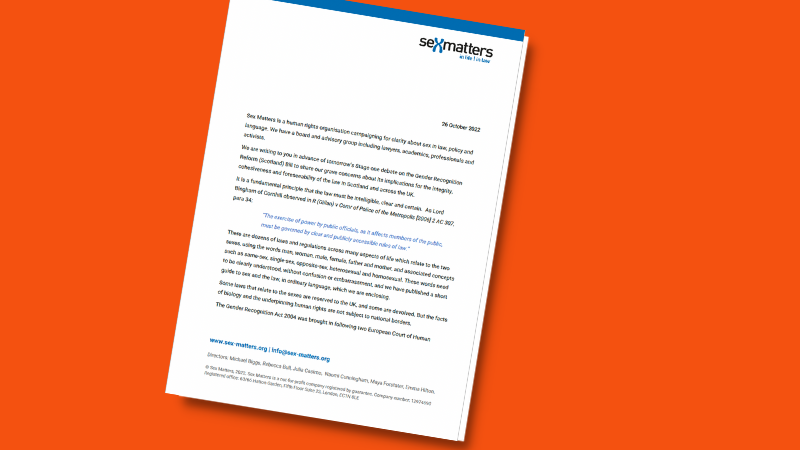Sex Matters writes to MSPs

Tomorrow 27th October is the Stage 1 debate on the Gender Recognition Reform Bill by the Scottish Parliament. Sex Matters has written to MSPs and sent them a copy of our “Sex and the Law” booklet.
Equality law remains an area which is reserved for UK wide legislation, yet the Scottish Parliament in considering passing a law which will modify the meaning of words related to the two sexes in other laws, including the Equality Act 2010.
There are dozens of laws across the UK that relate to the sexes, and to concepts such as same-sex and opposite-sex. Currently there are two legal options in answer to the question “what is a woman?” in relation to any particular law. “Sex” can either refer to biological sex or sex as modified by a GRC under the Equality Act 2004. As Lord True and Mark Spencer MP told parliamentarians in Westminster, legislators should use clarifying wording when making new laws to avoid confusion.
The Scottish Bill will introduce a third option; sex as modified by a Scottish GRC. The Scottish Government’s bill uses a completely different set of criteria to the 2004 Act.
Being able to understand the law is a basic human right. It is a fundamental principle that the law must be intelligible, clear and foreseeable. As Lord Bingham of Cornhill observed in R (Gillan) v Comr of Police of the Metropolis [2006] :
“The exercise of power by public officials, as it affects members of the public, must be governed by clear and publicly accessible rules of law.”
If the meaning of words in UK laws agreed in Westminster can be changed by parliamentarians in Edinburgh this undermines the ability of legislators to make clear laws, judges to interpret them, and police, officials and citizens to understand what they mean. A Gender Recognition Reform Law (Scotland) is likely to face legal challenge on this basis.
Our concerns echo those of the Equality and Human Rights Commission, which has also written with concerns about interaction with the Equality Act, Murray Blackburn Mackenzie, who have raised numerous issues, and For Women Scotland, who call on MSPs to vote against the bill.
